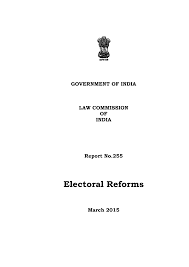
Whatsapp 93125-11015 For Details


Context
In India, the practice of allowing a single candidate to contest elections from multiple constituencies, though legally permitted, has raised several concerns regarding its impact on the electoral process, financial transparency, and democratic values. Although it may offer certain advantages to political leaders, the practice has been criticized for undermining the essence of democracy by prioritizing personal interests over public welfare. The need to reform or ban this practice has been a subject of intense debate, particularly in the context of promoting greater accountability, transparency, and fairness in elections.
Background of the Practice
The Indian Constitution mandates elections every five years for the Lok Sabha and Legislative Assemblies, under the supervision of the Election Commission of India (ECI). Prior to 1996, candidates were allowed to contest elections from any number of constituencies, leading to frequent by-elections when successful candidates vacated seats to focus on others. This resulted in unnecessary expenditure and disruptions in the democratic process. To address this, the Representation of the People Act, 1951, was amended in 1996, limiting candidates to contesting from two constituencies.
However, despite this limitation, the practice of "One Candidate, Multiple Constituencies" (OCMC) continues to persist, with candidates still seeking to contest from more than one seat, often leading to negative consequences.
Challenges Posed by OCMC
Financial Burden on Public Resources
The practice of multiple constituencies leads to frequent by-elections, which significantly increases the cost of conducting elections. For example, the general elections of 2024 cost taxpayers approximately ₹6,931 crore, while by-elections due to candidates vacating seats could cost around ₹130 crore per instance. Additionally, the financial resources mobilized by political parties, often involving unaccounted funds, undermine the transparency of the electoral system.
Distortion of Electoral Balance
By-elections tend to favor the ruling party, which can leverage state resources and patronage to secure victories, creating an uneven playing field. This disadvantages opposition parties, disrupting the balance necessary for a healthy democracy.
Disproportionate Financial Pressure
For the candidates who vacate constituencies after winning, the financial strain of holding multiple seats can create significant resource imbalance, as parties are forced to reinvest heavily to defend their position in by-polls.
Undermining Democratic Integrity
The practice of contesting from multiple constituencies often shifts the focus from serving the people to maintaining personal political survival. This results in leaders prioritizing personal ambition over the welfare of the constituency they represent, reinforcing the trend of leader-centric or family-run political parties.
Voter Disillusionment
The practice of vacating seats post-election leads to voter dissatisfaction, as seen in the Wayanad by-election, where voter turnout dropped sharply following the candidate’s exit. Voters may feel that their electoral choices are being disregarded, which erodes trust in the democratic process.
International Comparisons
Countries like Pakistan and Bangladesh allow candidates to contest multiple constituencies, though with different regulations regarding the number of seats they must vacate after winning. In contrast, the United Kingdom banned this practice in 1983, aiming to promote clearer accountability and reduce electoral complexities. Most European democracies have followed similar paths, phasing out OCMC to streamline their electoral systems and enhance public trust.
Recommendations for Reform
Prohibit OCMC
One of the most straightforward solutions is to amend the Representation of the People Act to prohibit candidates from contesting multiple constituencies altogether. This recommendation has been endorsed by the Election Commission of India and the Law Commission of India in the past.
Impose Financial Penalties
Candidates who vacate constituencies after winning could be made to bear the full financial cost of the by-elections, as suggested by the ECI in 2004. This would deter opportunistic behavior and reduce unnecessary electoral expenses.
Delay By-Elections
An amendment to Section 151A of the Representation of the People Act could delay by-elections for up to a year to allow sufficient time for fair preparation and informed decision-making by voters. This would ensure that political parties do not exploit by-elections as a tool for political advantage.
Conclusion
The practice of one candidate contesting multiple constituencies poses a significant challenge to India's democratic integrity, raising concerns about voter disenfranchisement, financial inefficiency, and political opportunism. While reforms will require broad political consensus, instituting a policy of "one candidate, one constituency" would align more closely with democratic ideals and promote greater accountability, fairness, and transparency in the electoral process. Strengthening electoral laws to limit OCMC would restore public trust and improve the functioning of India’s parliamentary democracy.